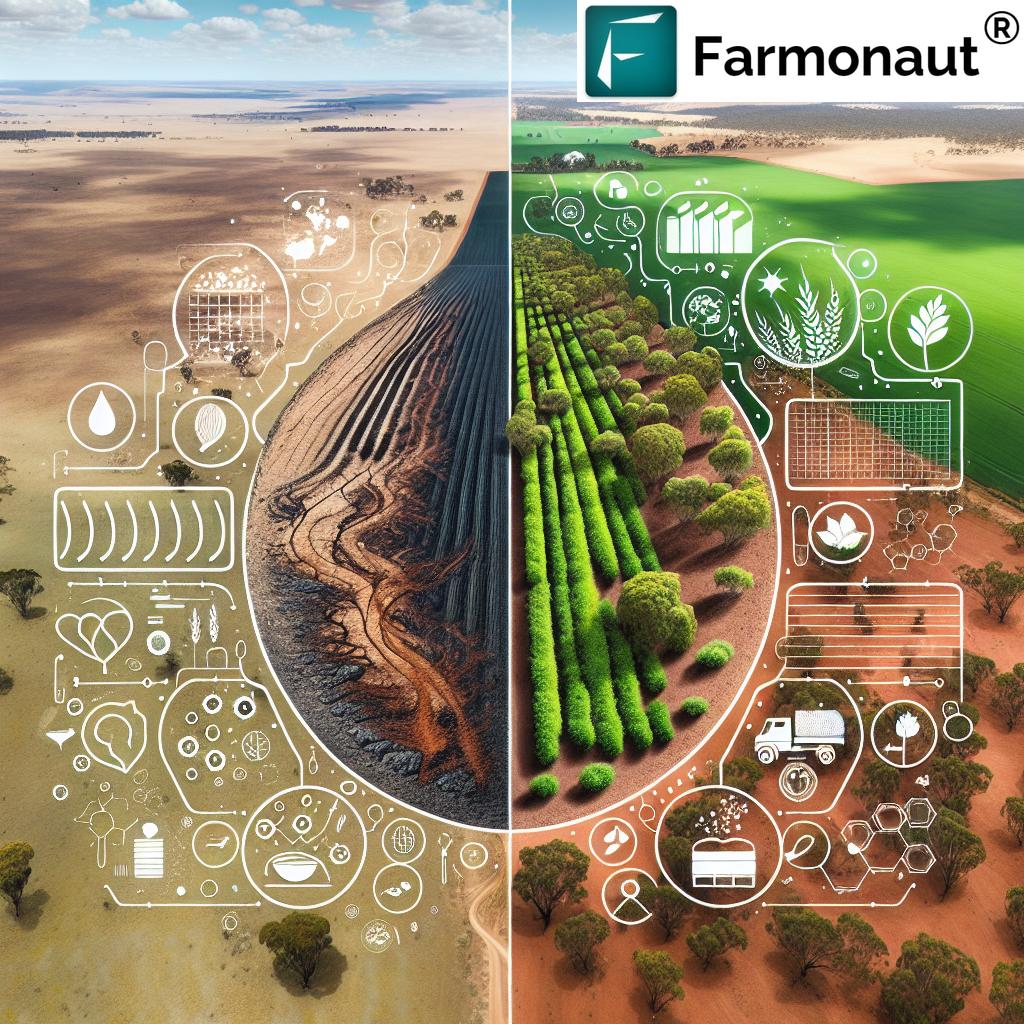Unlocking Agricultural Innovation: How Queensland’s Diverse Workforce Program Bridges Skill Gaps in Horticulture
“Queensland’s Diverse Workforce Program addresses skill gaps in 5 key areas, including integrated pest management and agricultural waste processing.”
In the heart of Australia’s agricultural landscape, Queensland is pioneering a revolutionary approach to address the evolving challenges in horticulture. We’re excited to delve into the transformative Diverse Queensland Workforce program, an initiative that’s not just bridging skill gaps but also cultivating a new era of agricultural innovation. This groundbreaking project is reshaping the future of farming in the Sunshine State, particularly in the fertile Darling Downs region.
The Dawn of Agricultural Workforce Diversity
As we navigate the complexities of modern agriculture, the need for a diverse, skilled workforce has never been more apparent. The Diverse Queensland Workforce program stands at the forefront of this agricultural renaissance, offering a beacon of hope for the industry’s future. By focusing on agricultural workforce diversity, this initiative is not just filling jobs; it’s cultivating a rich tapestry of skills, experiences, and perspectives that are vital for the sector’s growth and sustainability.

The program’s core objective is to address the critical skill shortages that have long plagued Queensland’s horticulture sector. By tapping into a pool of international talent, including migrants, students, and refugees, the initiative is injecting fresh perspectives and specialized knowledge into the industry. This approach not only solves immediate workforce needs but also lays the groundwork for long-term innovation and growth.
Bridging Skill Gaps Through Innovative Approaches
At the heart of the Diverse Queensland Workforce program is a comprehensive skill gap analysis that has identified key areas where expertise is most needed. This data-driven approach ensures that the program’s efforts are targeted and effective, addressing the most pressing needs of the horticulture industry.
| Skill Area | Current Gap (Estimated %) | Program Impact (Estimated %) |
|---|---|---|
| Integrated Pest Management | 40% | 25% |
| Agricultural Waste Processing | 35% | 20% |
| Digital Farming Systems | 50% | 30% |
| Renewable Energy in Agriculture | 45% | 15% |
| Sustainable Farming Practices | 30% | 20% |
| Agritech Innovation | 55% | 35% |
This table illustrates the significant impact the program is having on reducing skill gaps across various critical areas in horticulture. By focusing on these key skills, the initiative is not just filling positions but is actively shaping the future of agriculture in Queensland.
Harnessing International Agricultural Experience
One of the program’s most innovative aspects is its focus on leveraging international agricultural experience. Participants from diverse backgrounds bring with them a wealth of knowledge and practices that can be adapted to Queensland’s unique agricultural landscape. This cross-pollination of ideas is proving to be a catalyst for innovation in areas such as:
- Integrated Pest Management: Techniques from countries with similar climates are being adapted to Queensland’s ecosystems.
- Sustainable Farming Practices: Traditional methods from various cultures are being integrated with modern Australian approaches.
- Agritech Innovation: International participants are bringing cutting-edge technological skills to enhance digital farming systems.
The program’s success in harnessing this diverse expertise is evident in the rapid adoption of new practices across farms in the Darling Downs region. Farmers are reporting increased crop yields, reduced pesticide use, and more efficient water management – all direct results of the innovative techniques introduced by program participants.
As we can see in this video, the integration of satellite technology in agriculture, similar to the innovations brought by the Diverse Queensland Workforce program, is revolutionizing land use and management practices. This synergy between diverse workforce skills and advanced technology is propelling Queensland’s horticulture sector into a new era of efficiency and sustainability.
Creating Pathways for Agricultural Career Opportunities
The Diverse Queensland Workforce program isn’t just about filling immediate job vacancies; it’s about creating sustainable career pathways in agriculture. By offering a blend of vocational training, on-the-job experience, and professional development, the program is building a robust pipeline of skilled workers for the future.
“The Darling Downs region in Queensland is experiencing a transformation in horticulture jobs through innovative skill gap analysis and workforce diversity.”
Key components of the career development aspect include:
- Tailored Training Programs: Customized courses that blend theoretical knowledge with practical skills specific to Queensland’s agricultural needs.
- Mentorship Initiatives: Pairing experienced local farmers with international participants for knowledge exchange and cultural integration.
- Language Support: English language courses tailored to agricultural terminology and workplace communication.
- Progression Pathways: Clear career advancement routes from entry-level positions to specialized roles and management opportunities.
This comprehensive approach ensures that participants not only find immediate employment but also have the opportunity to grow and contribute to the industry long-term. It’s a win-win situation where farms benefit from a skilled, committed workforce, and participants build rewarding careers in a thriving sector.
Fostering Innovation in Sustainable Farming Practices
Sustainability is at the core of the Diverse Queensland Workforce program. By bringing together diverse perspectives and experiences, the initiative is driving innovation in sustainable farming practices. This focus aligns perfectly with global trends towards environmentally conscious agriculture and positions Queensland as a leader in eco-friendly farming.

Some of the key areas where the program is making significant strides include:
- Water Conservation: Implementing innovative irrigation techniques and water recycling systems.
- Soil Health Management: Introducing crop rotation strategies and organic fertilization methods to maintain soil fertility.
- Biodiversity Preservation: Developing farming practices that protect and enhance local ecosystems.
- Carbon Footprint Reduction: Adopting energy-efficient farming equipment and exploring renewable energy sources for farm operations.
These sustainable practices not only benefit the environment but also contribute to the long-term viability and profitability of Queensland’s farms. By embracing these methods, farms in the region are setting new standards for sustainable agriculture, attracting environmentally conscious consumers, and opening up new market opportunities.
Agritech Innovation: The Digital Revolution in Farming
The Diverse Queensland Workforce program is playing a crucial role in accelerating the adoption of agritech innovations across the region. By bringing in participants with diverse technological backgrounds, the program is helping to bridge the digital divide in agriculture.
This video showcases advanced agri solutions similar to those being implemented through the Diverse Queensland Workforce program. Precision crop area estimation and other digital farming technologies are transforming agricultural practices, making them more efficient and data-driven.
Key areas of agritech innovation being introduced include:
- Precision Agriculture: Utilizing GPS-guided machinery and drones for targeted crop management.
- IoT Sensors: Implementing networks of sensors to monitor soil conditions, crop health, and weather patterns in real-time.
- Data Analytics: Employing big data and AI to analyze farming patterns and optimize decision-making.
- Robotics: Introducing automated systems for tasks like harvesting and sorting, increasing efficiency and reducing labor costs.
These technological advancements are not just improving efficiency; they’re revolutionizing how farms operate. By embracing these innovations, Queensland’s horticulture sector is positioning itself at the forefront of modern agriculture, ready to meet the challenges of feeding a growing global population.
Addressing Skill Gaps in Specialized Areas
The Diverse Queensland Workforce program has been particularly effective in addressing skill gaps in specialized areas of horticulture. By bringing in experts from around the world, the program is introducing cutting-edge techniques and knowledge in areas that are critical for the future of agriculture.
Some of the specialized areas being addressed include:
- Integrated Pest Management (IPM): Introducing eco-friendly pest control methods that reduce reliance on chemical pesticides.
- Agricultural Waste Processing: Implementing innovative techniques for turning agricultural waste into valuable resources, such as biofuels or organic fertilizers.
- Renewable Energy in Agriculture: Exploring ways to integrate solar, wind, and biomass energy sources into farm operations.
- Plant Breeding and Genetics: Developing crop varieties that are more resistant to pests, diseases, and climate change impacts.
These specialized skills are not just filling immediate gaps; they’re laying the groundwork for long-term innovation and sustainability in Queensland’s agriculture sector.
Building a More Resilient Agricultural Workforce
One of the most significant outcomes of the Diverse Queensland Workforce program is the creation of a more resilient and adaptable agricultural workforce. By bringing together people from diverse backgrounds, the program is fostering a culture of innovation, problem-solving, and cross-cultural collaboration.
This video highlights the importance of cultivating innovation in agriculture, a key focus of the Diverse Queensland Workforce program. By fostering a culture of innovation, the program is helping to build a more resilient and adaptable agricultural sector in Queensland.
Key aspects of this resilience-building include:
- Adaptability to Climate Change: Diverse perspectives bring new ideas for adapting to changing weather patterns and environmental conditions.
- Crisis Management Skills: International participants often bring experience in dealing with various agricultural challenges, enhancing the sector’s ability to respond to crises.
- Cultural Intelligence: A diverse workforce fosters better understanding and communication with international markets and partners.
- Continuous Learning Culture: The program encourages a mindset of lifelong learning and adaptation, crucial for staying ahead in a rapidly evolving industry.
This enhanced resilience is not just benefiting individual farms; it’s strengthening the entire agricultural ecosystem of Queensland, making it better prepared to face future challenges and seize new opportunities.
Bridging Cultural Divides in Agriculture
An often overlooked but crucial aspect of the Diverse Queensland Workforce program is its role in bridging cultural divides within the agricultural community. By bringing together people from various backgrounds, the program is fostering greater understanding and collaboration across cultures.
This cultural integration is having several positive effects:
- Enhanced Communication: Improved cross-cultural communication skills are leading to better teamwork and problem-solving on farms.
- Global Market Insights: Diverse perspectives are providing valuable insights into international market preferences and trends.
- Community Enrichment: Rural communities are being revitalized by the influx of diverse cultures and ideas.
- Breaking Down Stereotypes: The program is challenging preconceptions about agriculture and who can be successful in the industry.
By fostering this cultural exchange, the program is not just addressing skill gaps; it’s creating a more inclusive and globally connected agricultural sector in Queensland.
The Future of Agriculture in Queensland
As we look to the future, the Diverse Queensland Workforce program is set to play a pivotal role in shaping the landscape of agriculture in the state. The program’s focus on innovation, sustainability, and diversity is perfectly aligned with the global trends that are transforming the agricultural sector.
This video explores the role of artificial intelligence in agriculture, highlighting how technological advancements, similar to those introduced through the Diverse Queensland Workforce program, are revolutionizing farming practices. The integration of AI and diverse workforce skills is key to the future of agriculture in Queensland.
Key trends that the program is helping to drive include:
- Digitalization of Agriculture: Accelerating the adoption of digital technologies and data-driven decision-making in farming.
- Sustainable Intensification: Developing methods to increase agricultural productivity while minimizing environmental impact.
- Global Connectivity: Positioning Queensland’s agriculture sector as a key player in the global food supply chain.
- Agri-Tourism: Leveraging cultural diversity to create unique farm-to-table experiences and agricultural tourism opportunities.
By addressing these trends and continually evolving to meet new challenges, the Diverse Queensland Workforce program is ensuring that Queensland’s agriculture sector remains competitive, sustainable, and innovative for generations to come.
Conclusion: A New Era for Queensland’s Horticulture
The Diverse Queensland Workforce program represents a bold step towards a more innovative, sustainable, and inclusive future for horticulture in Queensland. By bridging skill gaps, fostering innovation, and embracing diversity, this initiative is not just addressing current challenges; it’s laying the groundwork for a thriving agricultural sector that can adapt to future needs.
As we’ve explored throughout this blog, the program’s impact extends far beyond just filling job vacancies. It’s creating a ripple effect of positive change across the entire agricultural ecosystem:
- Introducing cutting-edge sustainable farming practices
- Driving agritech innovation and digital transformation
- Building a more resilient and adaptable workforce
- Fostering cross-cultural understanding and collaboration
- Positioning Queensland as a leader in modern, sustainable agriculture
The success of this program serves as a model for other regions and industries, demonstrating the power of diversity and innovation in addressing complex challenges. As we look to the future, it’s clear that initiatives like the Diverse Queensland Workforce program will play a crucial role in shaping a more sustainable, productive, and inclusive agricultural sector not just in Queensland, but around the world.
FAQ Section
Q: Who is eligible to participate in the Diverse Queensland Workforce program?
A: The program is open to migrants, international students, and refugees with backgrounds or interest in agriculture. It also welcomes local Australians looking to transition into the horticulture sector.
Q: What types of training are offered through the program?
A: The program offers a range of training, including vocational courses, on-the-job training, language support, and specialized workshops in areas like integrated pest management and digital farming systems.
Q: How long does the program last?
A: The duration can vary depending on the specific pathway and role. Some participants may be in short-term placements, while others could be on longer-term career development tracks.
Q: Are there opportunities for permanent employment after the program?
A: Yes, many participants have the opportunity to secure permanent positions with host farms or other agricultural businesses in Queensland after completing the program.
Q: How does the program benefit local farmers and the Queensland economy?
A: The program addresses critical skill shortages, introduces innovative practices, and enhances productivity in the horticulture sector. This, in turn, boosts the competitiveness of Queensland’s agriculture and contributes to economic growth.
For those interested in leveraging technology for agricultural innovation, consider exploring Farmonaut’s advanced satellite-based farm management solutions. Our platform offers valuable tools for crop health monitoring, AI-based advisory systems, and resource management, aligning perfectly with the innovative spirit of programs like the Diverse Queensland Workforce initiative.
Explore Farmonaut’s solutions:
For developers interested in integrating our technology:




















